ESSAYS
Michael Scriven has written extensive essays on French culture, politics and history, most notably on Jean-Paul Sartre and Paul Nizan. His essays include Sartre’s Existential Biographies, Sartre and the Media, Paul Nizan Communist Novelist and Jean Paul Sartre: Politics and Culture in Postwar France. He has also contributed articles to Les Temps Modernes and Europe.


“As if there could be true stories: things happen in one way and we retell them in the opposite way”.
Jean-Paul Sartre
Nausea

Between 1946 and 1981 approximately four thousand pages of Sartre’s biographical discourse were published; that’s almost two million words. Yet the average reader rarely, if ever, associates Sartre’s name with biography.
Sartre spent thirty years of his life engaged in one way or another in writing the biographies of several poets, novelists and dramatists, and one painter. Yet he vigorously proclaimed all the while that the primary task of a contemporary writer was to produce literature which mobilized the reading public towards participation in the significant socio-political issues of our time. 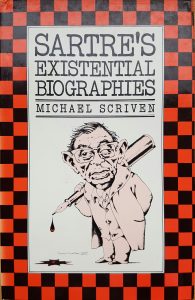
Awarded the Nobel Prize for literature in 1964 in recognition of the literary talents displayed in his autobiography, Les Mots, Sartre refused this prestigious accolade on the grounds that he did not wish to become the spokesman of a Western bourgeois cultural institution. Yet Les Mots, the most widely read of Sartre’s biographies, has been unanimously acclaimed by the bourgeois reading public precisely and paradoxically because it sanctifies in some way the very bourgeois cultural institutions that Sartre relentlessly attacks.
Towards the end of his life, Sartre declared that of all the books that he had written those which came closest to his literary ideal were his biographies of Genet and Flaubert. Yet very few people have read either of them. Their serpentine length, their methodological complexity and their sheer cost deter a mass readership. Despite Sartre’s evident concern to produce democratic literature for the majority, his biographies of Genet and Flaubert are destined to be studied by a specialized academic elite, not the man in the street.
Manifestly, Sartre’s existential biographies are a network of contradictions which epitomize the contradictory nature of literature in the society in which we live. This book is an attempt to explain some of these contradictions.

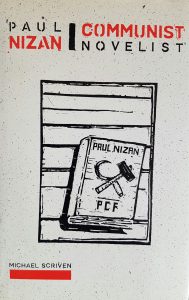
Paul Nizan died in 1940 at the age of 35. A dedicated member of the French communist party throughout his life, he nonetheless resigned from the party in September 1939, following the Nazi-Soviet pact of non-aggression and the Soviet invasion of Poland.
Judged a traitor to the communist cause in its hour of need, he was subsequently denigrated by the PCF during the Cold war period, and was rescued from oblivion only in 1960 when his lifelong friend Jean-Paul Sartre prefaced a new edition of Nizan’s first angry anti-establishment text, Aden Arabie.
Throughout his life Nizan produced a wide range of communist inspired writings, notably three novels – Antoine Bloyé, Le Cheval de Troie and La Conspiration. The blend of communist militancy and existential angst which Nizan distils in each of these novels is the centre of analysis in this book.

Sartre and the Media is the first book to offer a systematic account of Sartre’s involvement in press publications 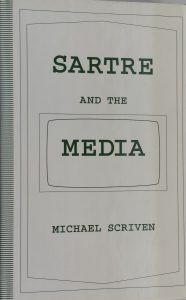 and radio and television broadcasting in postwar France.
and radio and television broadcasting in postwar France.
Sartre’s awareness of the growing power of the media to shape and influence public opinion was the motivating force underlying his interventions in the press from Combat and Le Figaro in 1944-45 to La Cause du Peuple, J’Accuse and Libération in 1970-74 and in the French state-controlled radio and television network from the `Tribune des Temps Modernes’ radio series of 1947 to the aborted Antenne 2 television history series of 1974-75.
Focused principally on the nature of the relations between intellectuals and the media, this book will appeal to those interested in the issues of freedom of expression and censorship in contemporary France.

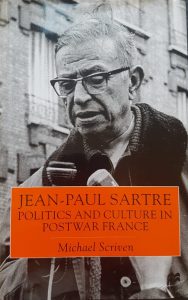 This book offers an assessment of Sartre as an exemplary figure in the evolving political and cultural landscape of post-1945 France.
This book offers an assessment of Sartre as an exemplary figure in the evolving political and cultural landscape of post-1945 France.
Sartre’s originality is located in the tense relationship 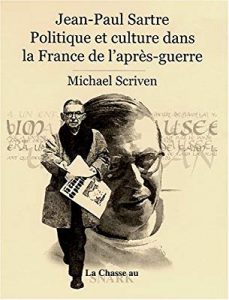 that he maintained between deeply held revolutionary beliefs and a residual yet critical attachment to traditional forms of cultural expression.
that he maintained between deeply held revolutionary beliefs and a residual yet critical attachment to traditional forms of cultural expression.
A series of case-studies centred on Gaullism, communism, Maoism, the theatre, art criticism, and the media, illustrate the continuing relevance and appeal of Sartre to the contemporary world.
MICHAEL SCRIVEN ESSAYS ON WRITERS

FICTITIOUS BOOKS ESSAYS
•••
Follow Solitanu’s Blog on Tumblr
Follow Michael Scriven @ Fictitious Books fibs on
• Twitter • Instagram • Pinterest •
